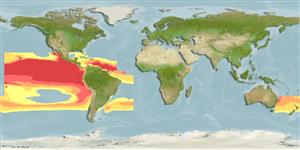>
Aulopiformes (Grinners) >
Scopelarchidae (Pearleyes)
Etymology: Scopelarchoides: Greek, skopelos = a lantern fish + Greek, archos = anus + Greek, oides = similar (Ref. 45335).
Eponymy: John Treadwell Nichols (1883–1958) was an American ichthyologist, mammalogist and ornithologist. [...] (Ref. 128868), visit book page.
Environment: milieu / climate zone / depth range / distribution range
Ekologi
marina batypelagisk; djupintervall 1 - 3294 m (Ref. 26340). Deep-water; 27°N -
Western Central Atlantic: Cuba (Ref. 26340). Eastern Pacific: Baja California, Mexico (about 27°N) to equatorial waters off Panama and Colombia (5°-9°N), and off Peru (about 6°-12°S) (Ref. 35929); also Chile (Ref. 9068).
Size / Vikt / Age
Maturity: Lm ? range ? - ? cm
Max length : 10.5 cm SL hane/ej könsbestämd; (Ref. 130965)
Taggstrålar i ryggfenan (totalt) : 0; Mjukstrålar i ryggfenan (totalt) : 6 - 7; Taggstrålar i analfenan: 0; Mjukstrålar i analfenan: 20 - 23; Ryggkotor: 45 - 48. Branchiostegal rays: 8.
Occur in shallower part of depth range at night, deeper during the day (Ref. 35929). Oviparous, with planktonic larvae (Ref. 35929). Synchronous hermaphrodites (Ref. 35929).
Life cycle and mating behavior
Könsmognad | Reproduktion | Lek | Ägg | Fecundity | Larver
Claro, R., 1994. Características generales de la ictiofauna. p. 55-70. In R. Claro (ed.) Ecología de los peces marinos de Cuba. Instituto de Oceanología Academia de Ciencias de Cuba and Centro de Investigaciones de Quintana Roo. (Ref. 26340)
IUCN Red List Status (Ref. 130435: Version 2024-2)
Threat to humans
Harmless
Human uses
Verktyg
Special reports
Download XML
Internet-källor
Estimates based on models
Preferred temperature (Ref.
123201): 3.5 - 9.5, mean 5.2 °C (based on 238 cells).
Phylogenetic diversity index (Ref.
82804): PD
50 = 0.5313 [Uniqueness, from 0.5 = low to 2.0 = high].
Bayesian length-weight: a=0.01122 (0.00514 - 0.02450), b=3.04 (2.87 - 3.21), in cm total length, based on all LWR estimates for this body shape (Ref.
93245).
Trofisk nivå (Ref.
69278): 4.1 ±0.7 se; based on size and trophs of closest relatives
Fishing Vulnerability (Ref.
59153): Low vulnerability (10 of 100).
